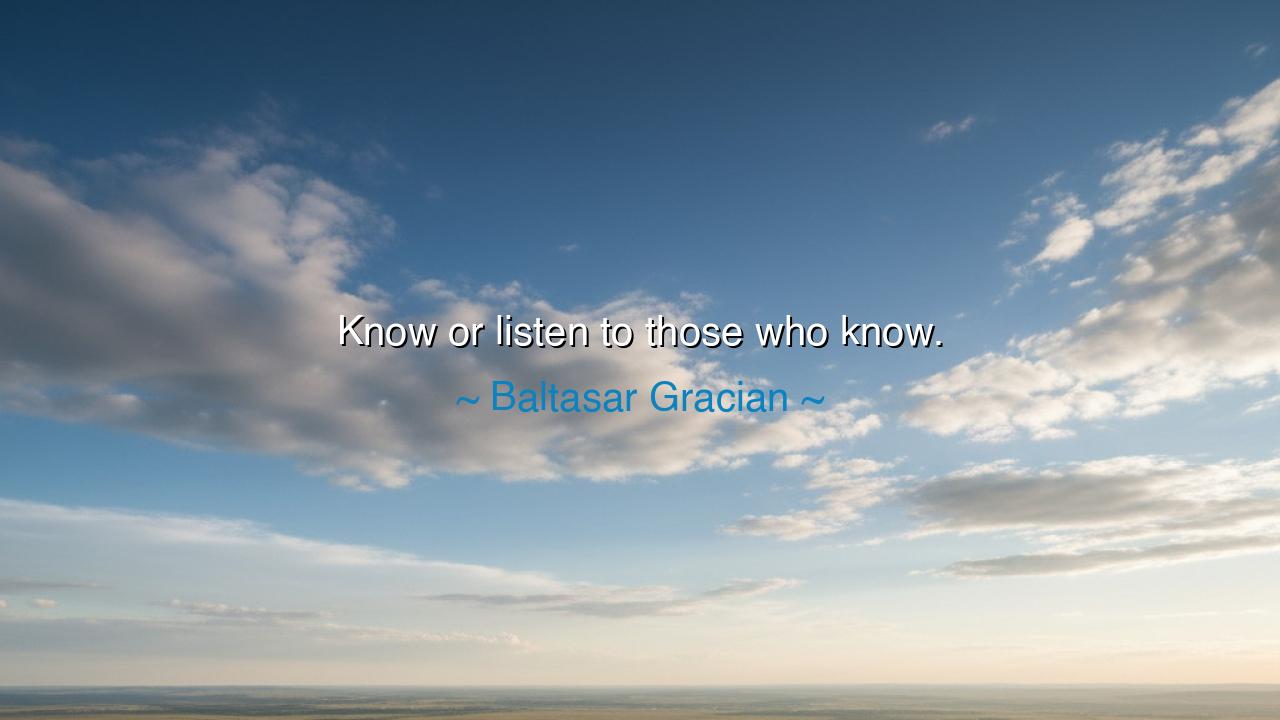
Know or listen to those who know.






In the words of Baltasar Gracián, the wise Spanish Jesuit and master of maxims, we are given a command as sharp as a sword: “Know or listen to those who know.” This phrase, though brief, contains within it the essence of wisdom. It reminds us that life offers two noble paths: either to gain knowledge through one’s own study and striving, or to humble oneself and learn from those who have already walked the road. To refuse both paths is to stumble in ignorance, to live blind while light is all around.
The origin of this saying is found in the struggle of man with his own pride. Many are too impatient to know, too arrogant to listen, and thus they repeat the mistakes of those before them. Gracián, living in the turbulence of seventeenth-century Spain, saw how men ruined themselves not through lack of opportunity, but through refusal to heed counsel. To him, wisdom was not the possession of the elite alone—it was the treasure available to any who would either seek it or hear it. His words call us to humility, to the recognition that our lives are too short to learn everything by ourselves; therefore, we must bend our ear to the wisdom of others.
History speaks with many witnesses. Consider the tale of Alexander the Great, who sought to conquer the world. Though a man of unmatched ambition, he did not rely on ambition alone. He studied under Aristotle, listening to the wisdom of philosophy, science, and governance. By combining his own courage with the teachings of his master, Alexander rose above ordinary kings and carved his name into eternity. He embodied Gracián’s law: to know by study, and to listen to those who know, is to become more than one man—it is to inherit the strength of all men.
In contrast, we may recall the tragic story of King Rehoboam of Israel. When he ascended the throne, he was faced with a choice: to lighten the burdens of his people, as the elders advised, or to impose harsher rule, as his young companions urged. He scorned the wisdom of the elders and refused to listen to those who knew. His arrogance split the kingdom, and the glory of his reign perished in division. From him we learn the cost of ignoring Gracián’s command: when a leader despises knowledge and refuses counsel, his downfall is swift.
The meaning of this quote, then, is not only intellectual but deeply moral. To know requires diligence, discipline, and patience. To listen requires humility, respect, and openness of heart. Both paths demand virtue, and both lead to strength. Without them, man is left vulnerable to error, repeating failures that might have been avoided. To know or listen is to arm oneself with the wisdom of the ages; to refuse is to walk naked into battle.
The lesson for us is eternal: seek knowledge as if it were gold, and honor those who hold it. If you have the chance to study, to read, to question, seize it with all your strength. But if you lack the means, do not despair—sit at the feet of the wise, hear their stories, watch their steps, and make their experience your own. For the wise man learns from his own study, but the wiser man learns also from the lives of others.
Practical counsel is this: each day, dedicate time to knowing—read a page, practice a skill, reflect upon your life. And each week, dedicate time to listening—seek out mentors, elders, teachers, or even friends whose lives embody lessons you have not yet lived. Ask questions, receive their words without pride, and carry them forward. In this way, you shall weave together your own knowledge with the wisdom of others, and your path will be brighter than if you walked alone.
Thus, Gracián’s words stand as a timeless beacon: “Know or listen to those who know.” To the proud, it is a rebuke; to the humble, it is an invitation. And to all generations it whispers the eternal truth—that wisdom is not beyond our reach, but awaits those who seek it with diligence and humility. And so, children of tomorrow, remember: do not walk in darkness when the lamp of knowledge is near. Either light your own flame, or follow the torchbearer—but above all, walk in the light.






AAdministratorAdministrator
Welcome, honored guests. Please leave a comment, we will respond soon